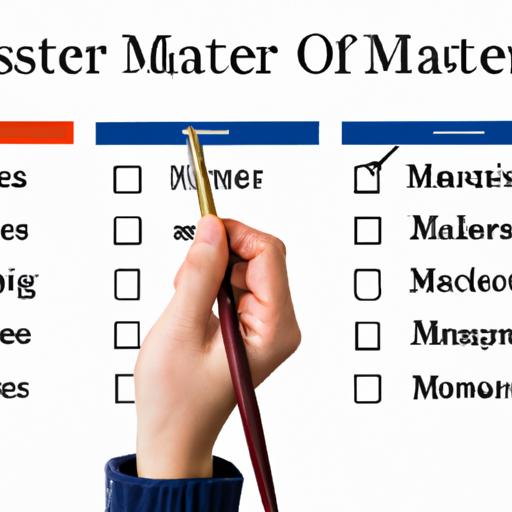Introduction
Are you passionate about shaping the minds of young learners and making a positive impact on their early development? Pursuing a master’s degree in early childhood education can be a transformative step towards a fulfilling and influential career in the field. In this article, we will delve into the world of early childhood education, exploring the benefits of obtaining a master’s degree, the curriculum and coursework involved, as well as the exciting career opportunities that await graduates. So, let’s embark on this journey and discover how a master’s degree in early childhood education can pave the way to a successful and rewarding future.

Curriculum and Coursework in a Master’s Degree Program
Core Courses in Early Childhood Education
A master’s degree in early childhood education equips aspiring educators with comprehensive knowledge and skills required to excel in the field. The program typically offers a range of core courses that delve into essential areas such as child development, curriculum planning, assessment and evaluation techniques, and classroom management strategies. These courses provide a solid foundation for understanding the unique needs of young learners and implementing effective teaching practices.
Specialization Options and Electives
To cater to diverse interests and career goals, many master’s degree programs offer specialization options and elective courses. These allow students to delve deeper into specific areas of early childhood education, such as special education, bilingual education, or educational psychology. By pursuing a specialization, students can enhance their expertise and become highly sought-after professionals in their chosen niche.
Fieldwork and Practical Experience
Hands-on experience is a vital component of a master’s degree in early childhood education. Most programs require students to engage in fieldwork and internships in real-world educational settings. This practical experience provides invaluable opportunities to apply theoretical knowledge, develop teaching skills, and gain insights into the day-to-day challenges and rewards of working with young children. It also allows students to build professional networks and establish connections that can open doors to future employment opportunities.
Research and Thesis Requirements
Completing a research component or a thesis is often a requirement in a master’s degree program in early childhood education. This undertaking allows students to contribute to the field by conducting original research or developing innovative approaches to teaching and learning. Research opportunities not only sharpen critical thinking and analytical skills but also provide a platform for students to showcase their expertise and make significant contributions to the advancement of early childhood education.
Career Opportunities and Advancement with a Master’s Degree
With a master’s degree in early childhood education, a world of exciting career opportunities awaits. Let’s explore some of the diverse paths that graduates can pursue:
Teaching Positions in Preschools and Kindergartens
A master’s degree in early childhood education qualifies graduates for leadership roles in preschools and kindergartens. Armed with advanced knowledge in child development, instructional strategies, and assessment techniques, these educators are equipped to create nurturing and stimulating learning environments. By implementing innovative teaching methods, promoting social-emotional development, and fostering a love for learning, they play a crucial role in shaping the foundation of a child’s educational journey.
Leadership Roles in Early Childhood Education
A master’s degree in early childhood education opens doors to leadership positions in the field. Graduates can aspire to become program directors, coordinators, or administrators in early childhood education centers or school districts. In these roles, they oversee curriculum development, manage staff, establish policies, and ensure compliance with educational standards. Through their guidance and expertise, they have the power to influence educational practices and shape the quality of early childhood programs.
Advocacy and Policy-Making Positions
For those passionate about advocating for the rights and well-being of young children, a master’s degree in early childhood education can be a stepping stone towards impactful policy-making positions. Graduates can contribute to the development and implementation of educational policies at local, state, or national levels. By leveraging their expertise and advocating for evidence-based practices, they can shape policies that promote equitable access to quality early childhood education and improve outcomes for all children.
Opportunities for Further Academic and Professional Growth
A master’s degree in early childhood education serves as a solid foundation for further academic and professional growth. Graduates can pursue doctoral studies in the field, conducting advanced research and contributing to the body of knowledge in early childhood education. Additionally, they can engage in professional development activities, attend conferences, and participate in workshops to stay updated on the latest research and best practices. Continuous learning and professional growth ensure that educators remain at the forefront of the field, offering the best possible educational experiences to young children.

Tips for Selecting the Right Master’s Degree Program
Choosing the right master’s degree program in early childhood education is a crucial decision that can shape your educational journey and future career prospects. Consider the following tips when making this important choice:
Accreditation and Program Reputation
Ensure that the program you choose is accredited by a recognized accrediting body. Accreditation ensures that the program meets rigorous academic standards and prepares graduates for successful careers in early childhood education. Additionally, research the program’s reputation and look for reviews or testimonials from current or former students to gain insights into the program’s quality and effectiveness.
Faculty Expertise and Research Opportunities
Investigate the qualifications and expertise of the faculty members in the program. Experienced and knowledgeable professors can provide valuable mentorship and guidance throughout your studies. Additionally, research the research opportunities available within the program. Engaging in research can enhance your learning experience, provide networking opportunities, and strengthen your credentials as an early childhood education professional.
Flexibility and Convenience of Program Delivery
Consider your personal circumstances and evaluate the flexibility and convenience of the program’s delivery format. Some programs offer online or part-time options, allowing you to balance your studies with work or other commitments. Assess whether the program’s schedule and format align with your lifestyle and learning preferences to ensure a smooth and successful educational journey.
Financial Aid Options and Affordability
Financing your master’s degree can be a significant consideration. Research the financial aid options available, such as scholarships, grants, or tuition assistance programs. Additionally, assess the program’s affordability and compare tuition costs with other similar programs. By exploring financial aid opportunities and selecting a program that aligns with your budget, you can embark on your educational journey with peace of mind.
Conclusion
In conclusion, pursuing a master’s degree in early childhood education can unlock a world of opportunities for personal and professional growth. Whether you aspire to be an exceptional classroom teacher, an influential leader, or a policy advocate, a master’s degree equips you with the knowledge, skills, and expertise to make a significant impact on the lives of young learners. Remember, choosing the right master’s degree program is crucial, so consider factors such as accreditation, faculty expertise, program flexibility, and financial aid options. Start your journey towards a fulfilling and rewarding career in early childhood education today!